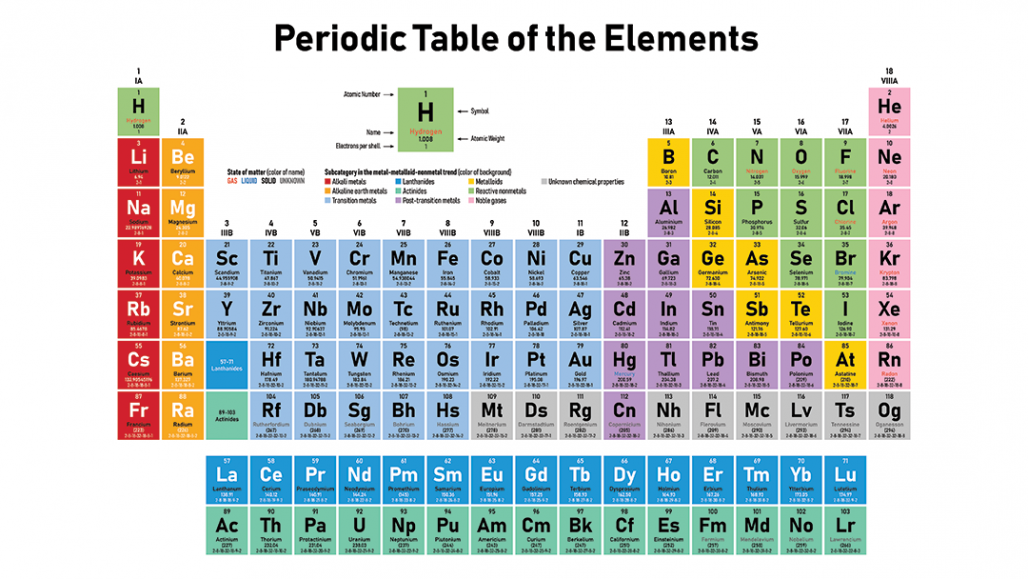Hi Friends .
Like Shear and Comments these Post.
The components from atomic numbers 1 (hydrogen) through 118 (oganesson) have been found or synthesized, finishing seven full columns of the periodic table.[1][2] The initial 94 components all happen normally, however some are discovered only in follow sums and a couple were found in nature only in the wake of having originally been synthesized.[n 1] Elements 95 to 118 have only been synthesized in research facilities or atomic reactors.[3] The amalgamation of components having higher atomic numbers is at present being sought after: these components would start an eighth line, and hypothetical work has been done to propose potential contender for this augmentation. Various engineered radionuclides of normally happening components have also been created in research facilities.



.The Periodic Table Learning.
Introduction of Periodic Table:-
The
periodic table, also known as the periodic table of components, is an
unthinkable showcase of the chemical components, which are masterminded
by atomic number, electron setup, and repeating chemical properties. The
structure of the table shows periodic patterns. The seven lines of the
table, called periods, by and large have metals on the left and
nonmetals on the right. The segments, called gatherings, contain
components with comparative chemical practices. Six gatherings have
acknowledged names just as relegated numbers: for instance, bunch 17
components are the incandescent lamp; and gathering 18 are the
respectable gases. Also showed are four straightforward rectangular
regions or squares related with the filling of various atomic orbitals.
आवर्त सारणी का परिचय: -
आवर्त
सारणी, जिसे अवयवों की आवर्त सारणी के रूप में भी जाना जाता है, रासायनिक
घटकों का एक अकल्पनीय प्रदर्शन है, जो परमाणु संख्या, इलेक्ट्रॉन सेटअप और
रासायनिक गुणों को दोहराते हुए महारत हासिल करते हैं। तालिका की संरचना
आवधिक पैटर्न दिखाती है। तालिका की सात पंक्तियाँ, जिन्हें पीरियड कहा जाता
है, और बड़ी के बाईं ओर धातुएँ होती हैं और दाईं ओर अधातुएँ। सेगमेंट,
जिन्हें कॉलिंग कहा जाता है, में तुलनात्मक रासायनिक प्रथाओं वाले घटक होते
हैं। छह सभाओं ने केवल मान्यता प्राप्त संख्या के रूप में नामों को
स्वीकार किया है: उदाहरण के लिए, गुच्छा 17 घटक गरमागरम दीपक हैं; और 18
इकट्ठा करना सम्मानजनक गैस हैं। यह भी दिखाया गया है कि चार सीधे आयताकार
क्षेत्र या वर्ग हैं जो विभिन्न परमाणु कक्षाओं के भरने से संबंधित हैं।
The components from atomic numbers 1 (hydrogen) through 118 (oganesson) have been found or synthesized, finishing seven full columns of the periodic table.[1][2] The initial 94 components all happen normally, however some are discovered only in follow sums and a couple were found in nature only in the wake of having originally been synthesized.[n 1] Elements 95 to 118 have only been synthesized in research facilities or atomic reactors.[3] The amalgamation of components having higher atomic numbers is at present being sought after: these components would start an eighth line, and hypothetical work has been done to propose potential contender for this augmentation. Various engineered radionuclides of normally happening components have also been created in research facilities.
118
(ऑगेसन) के माध्यम से परमाणु संख्या 1 (हाइड्रोजन) के घटक पाए गए हैं या
संश्लेषित किए गए हैं, जो आवर्त सारणी के सात पूर्ण स्तंभों को पूरा करते
हैं। [1] [२] प्रारंभिक 94 घटक सभी सामान्य रूप से होते हैं, हालांकि कुछ
को केवल अनुगमन के रूप में खोजा जाता है और एक जोड़े को प्रकृति में केवल
मूल रूप से संश्लेषित होने के मद्देनजर पाया गया था। [n 1] तत्व 95 से 118
केवल अनुसंधान सुविधाओं या परमाणु में संश्लेषित किए गए हैं। रिएक्टरों।
[3] उच्च परमाणु संख्या वाले घटकों का समामेलन वर्तमान में होने के बाद
किया जा रहा है: ये घटक एक आठवीं पंक्ति शुरू करेंगे, और इस वृद्धि के लिए
संभावित दावेदार का प्रस्ताव करने के लिए काल्पनिक काम किया गया है।
अनुसंधान सुविधाओं में सामान्य रूप से होने वाले घटकों के विभिन्न इंजीनियर
रेडियोन्यूक्लाइड भी बनाए गए हैं।

The
association of the periodic table can be utilized to determine
connections between the different component properties, and furthermore
to anticipate chemical properties and practices of unfamiliar or
recently synthesized components. Russian scientific expert Dmitri
Mendeleev distributed the principal unmistakable periodic table in 1869,
grew primarily to show periodic patterns of the then-known components.
He also anticipated a few properties of unidentified components that
were required to fill holes inside the table. The greater part of his
estimates end up being right. Mendeleev's thought has been gradually
extended and refined with the revelation or combination of further new
components and the advancement of new hypothetical models to clarify
chemical conduct. The advanced periodic table currently gives a valuable
structure to breaking down chemical responses, and keeps on being
broadly utilized in science, atomic material science and different
sciences.

आवर्त
सारणी की संगति का उपयोग विभिन्न घटक गुणों के बीच संबंध निर्धारित करने
के लिए किया जा सकता है, और इसके अलावा रासायनिक गुणों और अपरिचित या हाल
ही में संश्लेषित घटकों की प्रथाओं का अनुमान लगाने के लिए। रूसी वैज्ञानिक
विशेषज्ञ दिमित्री मेंडेलेव ने 1869 में प्रमुख अचूक आवर्त सारणी वितरित
की, मुख्य रूप से तत्कालीन ज्ञात घटकों के आवधिक पैटर्न को दिखाने के लिए
बढ़ी। उन्होंने अज्ञात घटकों के कुछ गुणों का भी अनुमान लगाया जो तालिका के
अंदर छेद भरने के लिए आवश्यक थे। उसके अनुमानों का बड़ा हिस्सा सही हो रहा
है। मेंडेलीव के विचार को धीरे-धीरे बढ़ाया गया है और रासायनिक घटकों को
स्पष्ट करने के लिए नए घटकों के रहस्योद्घाटन या संयोजन और नए काल्पनिक
मॉडल की उन्नति के साथ परिष्कृत किया गया है। उन्नत आवर्त सारणी वर्तमान
में रासायनिक प्रतिक्रियाओं को तोड़ने के लिए एक मूल्यवान संरचना प्रदान
करती है, और विज्ञान, परमाणु सामग्री विज्ञान और विभिन्न विज्ञानों में
व्यापक रूप से उपयोग की जाती है।




No comments:
Post a Comment